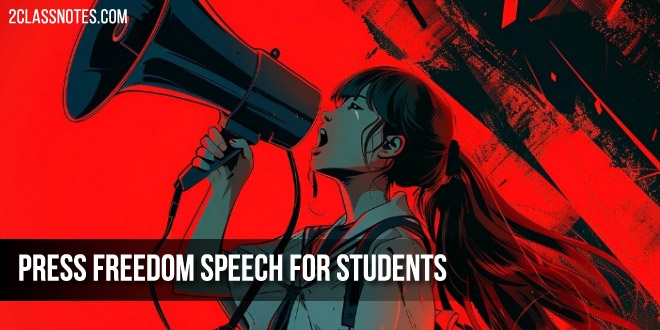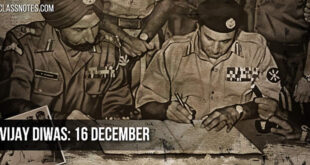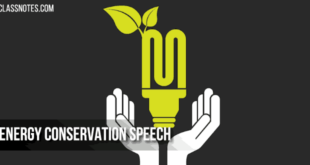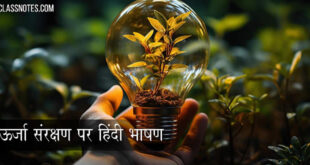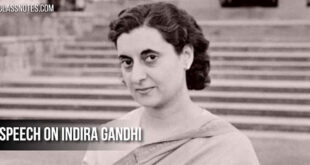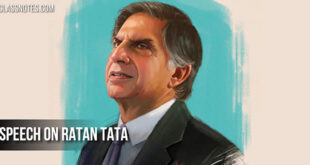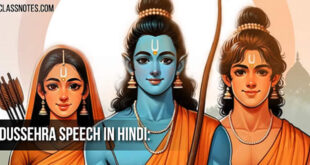Press Freedom Speech For Students: What is meant by ‘freedom of press’? Everyone wants freedom but with freedom also comes lot of responsibilities and if we are unable to justify both, then that freedom is taken away from us. So when we talk about freedom of press, we also talk about its work ethics and principles. Exploring intriguing speech topics sparks curiosity and encourages engaging discussions among listeners, making learning both exciting and meaningful. Considering the great relevance of the topic, we have covered speeches on freedom of press.
Speech On Press Freedom:
- Freedom of Press in India – Short
- Freedom of Press and Media – Long
- Freedom of Press in Democracy – Long
- Freedom of Press and Judiciary – Long
Long and Short Speech For Students:
Here, you would find both short speeches on freedom of press as well as long speeches on freedom of press which are easy to understand and carry a comprehensive picture about the subject. So browse through the pages and take hands-on knowledge about these pertinent topics.
Short Speech on Freedom of Press in India
Warm Greetings Ladies and Gentlemen,
Welcome to the speech ceremony of today!
As you all know that we have assembled here today to discuss about the freedom of press in India. But before we begin with the ceremony, let me first extend a note of special thanks to our special guest hon’ble …… for humbly accepting our request. He is the senior correspondent and journalist for past 20 years in the media industry.
Ladies and Gentlemen, I am Nargis Khan your host for today and would like to deliver a short speech on the said topic. The reason behind conducting this meet is because we are observing a lot of violence against the media persons and their freedom is constantly being suppressed by the people in power. Most of the media personalities have been reduced to play things in the hands of the ruling classes. Since media represents the voice of the people and any gross mishandling of this channel can deprive its people from the right to information, it becomes our responsibility to safeguard their freedom by raising our voice.
Freedom of Media or Freedom of Press is referred to as a principle where communication and expression via different media, including electronic and print media, particularly published materials should easily take place. It is an important right of the media persons which should be exercised freely by them. This sort of freedom doesn’t involve the intervention of an overarching state and the preservation of press freedom can be ensured through legal or constitutional mediums.
As per the governmental regulation, any government is liable to draw a mark of distinction between such materials which can be made public and others which are deliberately protected from public disclosure. The state information is protected because of any of the two reasons, i.e. the sorting of information as secret, sensitive or classified or the significance of information from the standpoint of preserving the national interest. Several governments are also bound to laws or legislation based on freedom of information, which is used to describe the sphere of national interest.
The freedom of media or press comes with the realm of freedom of expression and speech. In a democratic country like ours, the freedom of press becomes extremely essential as it serves as a watchdog on the three important facets of democracy, i.e. the legislature, executive and the judiciary. However, the freedom of press is conditional in nature and not absolute in the sense that it is subjected to some restrictions which are mentioned in the Article 19 (2). Mentioned below are the reason ground (for curtailing freedom of press) which can be found in the Article 19 (2):
- Integrity and sovereignty of India
- Public Order
- State Security
- Friendly associations with the foreign nationals
- Morality or decency
- Contempt of Court
We sincerely acknowledge that media plays a key role in ensuring public welfare, but sometimes it does act negligently. The Father of our Nation – Mahatma Gandhi – once said, “The role of journalism should be service. The Press is a great power, but just as an unchained torrent of water submerges the whole countryside and devastates crops, even so an uncontrolled pen serves but to destroy.” The democratic set up has three important pillars, as mentioned above, the legislative, the executive and the judiciary. The press functions as the fourth pillar in a democratic set up. The press plays a key role in meeting justice and ensuring public welfare, etc.
So the freedom of media should not be curbed but rather channelized so that its potential can be fully realized.
 Class Notes NCERT Solutions for CBSE Students
Class Notes NCERT Solutions for CBSE Students
